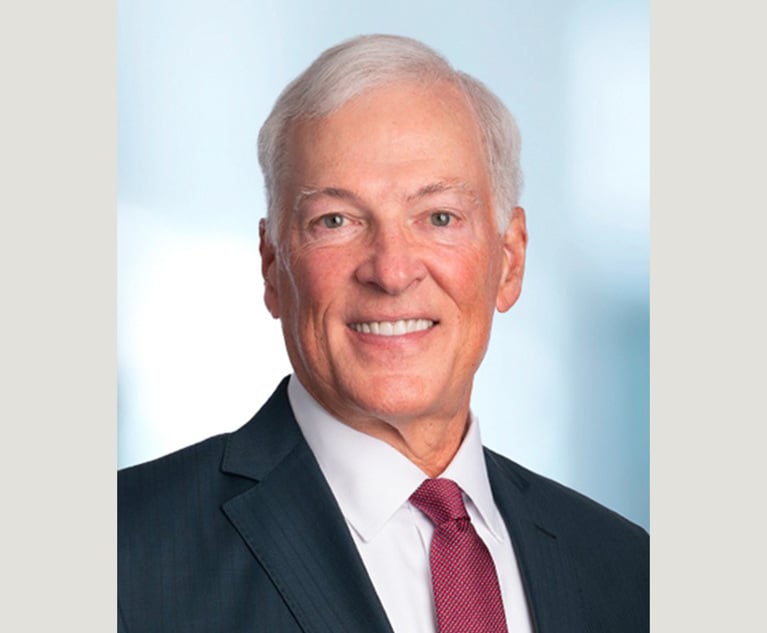Pelvic Mesh MDL Leadership Defends Settlement Record as Infighting Ramps Up
At the same time, another law firm has joined Kline & Specter in criticizing the set-aside request, saying some of the fee requests have not been fair and that money for the common benefit fees should not be taken from the plaintiffs' recoveries, but rather from the primary lawyer's fee.
December 04, 2018 at 02:43 PM
5 minute read

The leadership committee for the pelvic mesh multidistrict litigation is defending its settlement record and hitting back against recent criticism from Philadelphia firm Kline & Specter that the firms piloting the MDL are seeking to set aside too much of plaintiffs' recovery for attorney fees.
At the same time, another law firm has joined Kline & Specter in criticizing the set-aside request, saying some of the fee requests have not been fair and that money for the common benefit fees should not be taken from the plaintiffs' recoveries, but rather from the primary lawyer's fee.
The dispute comes as thousands of cases in the pelvic mesh MDL have begun to settle. According to federal records, the litigation topped out at nearly 107,000 claims, and, as of Nov. 15, the seven consolidated litigations have an inventory of 37,299.
The current value of the settlements, according to court records, is roughly $7.25 billion, and the total amount for settlements is expected to be around $11 billion. With the requested 5 percent set aside, that would make the total amount expected for the common benefit fund to reach $550 million.
In mid-November, Athens, Georgia-based Blasingame, Burch, Garrard & Ashley attorney Henry Garrard, who is chairman of the MDL's fee and compensation committee, petitioned the U.S. District Court for the Southern District of West Virginia to allow for a 5 percent set aside of all awards. That money would go toward attorneys fees and expenses for work that benefited the overall litigation.
Late last month, Kline & Specter attorney Shanin Specter filed a strongly-worded objection—calling the settlement amounts “puny” and saying the leadership committee was settling “inventories way too cheaply.” In a reply filed Monday, Garrard likewise pulled no punches, saying that the criticism was “blatant hypocrisy” since the firm “has undoubtedly been one of the primary beneficiaries of the MDL's stellar work product.”
“The reason that Kline & Specter is alone in its objection is that its arguments are entirely self-interested and self-serving based solely upon its desire for an increased allocation, in addition to lacking in factual or legal support,” Garrard said in the filing, adding later, “To seek to disparage the work of the MDL that allowed it to achieve the very success in the courtroom that it touts throughout its response is the height of disingenuity.”
In an emailed statement, Specter said, “The fee committee's response does not contradict a whit of our opposition to their request for a $550 million fee, which, if awarded, would unfairly treat the injured women. Instead, it tries to change the subject. The fee committee persists in withholding from the court, the injured women and their lawyers the precise number of cases that have been resolved and the precise per case average recoveries. The reason for this nondisclosure is simple: if revealed, these facts would confirm the failure of their performance.”
San Francisco attorney Rachel Abrams of Levin Simes Abrams, who is a member of the MDL's leadership team, was also critical of Specter's objection in a response filed Monday.
In making the argument that the settlements were too small to be rewarded with a 5 percent cut of all the plaintiffs' recoveries, Specter had said that, while verdicts averaged $9.8 million, the settlements averaged about $40,000. Abrams, however, said the argument was not a good way to evaluate the works the firms did for the MDL's common benefit.
“Every firm had the tools provided by the common benefit work product to negotiate the best settlements possible,” she said. “It is not the job of this court, or the participating firms, or Kline & Specter to engage in some sort of retrospective second-guessing of individual settlement values.”
But criticism of the fee request continued to mount Monday, as Aimee Wagstaff of the Colorado firm Andrus Wagstaff filed a response to the petition, saying that, since it is the client's individual attorney who receives the benefit of the common benefit work, the money should be taken from the lawyer's share, not the plaintiff's.
“Any attempt to use monies contributed by the plaintiff's/claimants' recoveries to pay common benefit fees would constitute a wrongful diversion of client money and should not be sanctioned by the court,” Wagstaff said.
In the six-page filing, Wagstaff also said her firm was not being treated fairly by the fee and compensation committee. She cited one example where a member of the committee, Clayton Clark of Clark, Love & Hutson, requested his firm be paid $45.5 million, or more than $960 an hour, while he recommended her firm receive $8.7 million, which comes to nearly $295 an hour.
According to Wagstaff, two members of the committee also told her they did not think her firm was being treated fairly, and recommended she file an objection.
“Ms. Wagstaff was further told that the FCC had inflated its own awards because the satisfaction of any appeals 'could only come from the awards recommended to FCC law firms,'” Wagstaff said in the filing.
“To date, this has not been a fair and equitable process and any effort to block an appeal is unjustified and should not be entered by this court,” Wagstaff said in the filing.
Neither Wagstaff, Garrard nor Clark returned a call seeking comment Tuesday.
This content has been archived. It is available through our partners, LexisNexis® and Bloomberg Law.
To view this content, please continue to their sites.
Not a Lexis Subscriber?
Subscribe Now
Not a Bloomberg Law Subscriber?
Subscribe Now
NOT FOR REPRINT
© 2025 ALM Global, LLC, All Rights Reserved. Request academic re-use from www.copyright.com. All other uses, submit a request to [email protected]. For more information visit Asset & Logo Licensing.
You Might Like
View All
Saxton & Stump Lands Newly Retired Ex-Chief Judge From Middle District of Pa.
3 minute read
Blank Rome Snags Two Labor and Employment Partners From Stevens & Lee
4 minute read
12-Partner Team 'Surprises' Atlanta Firm’s Leaders With Exit to Launch New Reed Smith Office
4 minute read
Morgan Lewis Shutters Shenzhen Office Less Than Two Years After Launch
Trending Stories
- 1SDNY Criminal Division Deputy Chief Returns to Debevoise
- 2Brownstein Adds Former Interior Secretary, Offering 'Strategic Counsel' During New Trump Term
- 3Tragedy on I-95: Florida Lawsuit Against Horizon Freight System Could Set New Precedent in Crash Cases
- 4Weil, Loading Up on More Regulatory Talent, Adds SEC Asset Management Co-Chief
- 5Big Banks Did Great Last Year. What Does That Mean for Big Law?
Who Got The Work
J. Brugh Lower of Gibbons has entered an appearance for industrial equipment supplier Devco Corporation in a pending trademark infringement lawsuit. The suit, accusing the defendant of selling knock-off Graco products, was filed Dec. 18 in New Jersey District Court by Rivkin Radler on behalf of Graco Inc. and Graco Minnesota. The case, assigned to U.S. District Judge Zahid N. Quraishi, is 3:24-cv-11294, Graco Inc. et al v. Devco Corporation.
Who Got The Work
Rebecca Maller-Stein and Kent A. Yalowitz of Arnold & Porter Kaye Scholer have entered their appearances for Hanaco Venture Capital and its executives, Lior Prosor and David Frankel, in a pending securities lawsuit. The action, filed on Dec. 24 in New York Southern District Court by Zell, Aron & Co. on behalf of Goldeneye Advisors, accuses the defendants of negligently and fraudulently managing the plaintiff's $1 million investment. The case, assigned to U.S. District Judge Vernon S. Broderick, is 1:24-cv-09918, Goldeneye Advisors, LLC v. Hanaco Venture Capital, Ltd. et al.
Who Got The Work
Attorneys from A&O Shearman has stepped in as defense counsel for Toronto-Dominion Bank and other defendants in a pending securities class action. The suit, filed Dec. 11 in New York Southern District Court by Bleichmar Fonti & Auld, accuses the defendants of concealing the bank's 'pervasive' deficiencies in regards to its compliance with the Bank Secrecy Act and the quality of its anti-money laundering controls. The case, assigned to U.S. District Judge Arun Subramanian, is 1:24-cv-09445, Gonzalez v. The Toronto-Dominion Bank et al.
Who Got The Work
Crown Castle International, a Pennsylvania company providing shared communications infrastructure, has turned to Luke D. Wolf of Gordon Rees Scully Mansukhani to fend off a pending breach-of-contract lawsuit. The court action, filed Nov. 25 in Michigan Eastern District Court by Hooper Hathaway PC on behalf of The Town Residences LLC, accuses Crown Castle of failing to transfer approximately $30,000 in utility payments from T-Mobile in breach of a roof-top lease and assignment agreement. The case, assigned to U.S. District Judge Susan K. Declercq, is 2:24-cv-13131, The Town Residences LLC v. T-Mobile US, Inc. et al.
Who Got The Work
Wilfred P. Coronato and Daniel M. Schwartz of McCarter & English have stepped in as defense counsel to Electrolux Home Products Inc. in a pending product liability lawsuit. The court action, filed Nov. 26 in New York Eastern District Court by Poulos Lopiccolo PC and Nagel Rice LLP on behalf of David Stern, alleges that the defendant's refrigerators’ drawers and shelving repeatedly break and fall apart within months after purchase. The case, assigned to U.S. District Judge Joan M. Azrack, is 2:24-cv-08204, Stern v. Electrolux Home Products, Inc.
Featured Firms
Law Offices of Gary Martin Hays & Associates, P.C.
(470) 294-1674
Law Offices of Mark E. Salomone
(857) 444-6468
Smith & Hassler
(713) 739-1250





